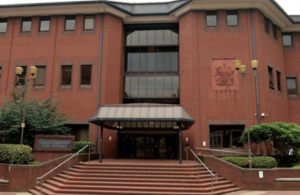20 Nightingale courtrooms remain open to boost capacity
A total of 20 Nightingale courtrooms will remain open in 2024 to allow more cases to be heard across the country, the government has announced today (16 February 2024).

- 20 Nightingale courtrooms will continue to hear cases in 2024 – from Swansea to London
- majority of rooms open until March 2025 to help tackle outstanding cases
- comes as Crown Court heard cases on over 100,000 days in total across the country
These temporary courtrooms, across nine venues, will continue to be used by judges to hear cases ranging from shoplifting to family proceedings and small claims hearings. The majority of the courtrooms will be open until March 2025.
First introduced in the pandemic to temporarily provide additional space for hearings, the government has decided to retain this extra capacity to provide speedier access to justice so that victims have their day in court as soon as possible.
The locations chosen to remain open in England and Wales have been identified where they can help reduce the number of local outstanding cases, support maintenance projects by hearing cases when nearby locations are temporarily closed or to make full use of judicial capacity in court areas where there are more judges available.
Justice Minister, Mike Freer, said:
People who break the law must face justice and ensuring these 20 extra courtrooms remain open in 2024 will do just that.
Crown Courts are already dealing with the highest number of cases than at any point since 2019. We want to keep making progress and deliver swifter access to justice.
The temporary courts staying open this year are:
- Barbican, London
- Chichester
- Cirencester
- Croydon
- Fleetwood, Blackpool
- Grand Connaught Rooms, London
- Maple House, Birmingham
- Swansea
- Telford
Today’s announcement marks the fourth year of the use of these temporary courts – originally dubbed Nightingale courts during the pandemic - and comes alongside a raft of measures implemented by the government to tackle the outstanding cases in the criminal courts. These include boosting investment, recruiting hundreds of judges across all the courts and tribunals and maximising the use of remote hearings.
More criminal cases are now reaching the Crown Court than at any point over the last two years. Last year they sat over 100,000 days in the Crown Court, and plan to sit over 100,000 days again this year.
More widely, the government is investing £220 million for essential modernisation and repair work of our court buildings across the two years to March 2025, minimising disruption which can be caused by unplanned maintenance work.
As planned, temporary courts in Maidstone and Wolverhampton will close at the end of March. This is because there is no longer a need for these venues and after this time, cases will return to being heard within the permanent Crown Court estate which has capacity to deal with them. Nightingales are being extended where an assessment for an operational need has taken place.
Notes to editors
- The 9 sites being extended beyond March 2024 are:
| Temporary court | Number of rooms | Type of work | Extended until |
|---|---|---|---|
| Barbican, London | 2 | Crown | August 2024 |
| Chichester | 2 | Crown | March 2025 |
| Cirencester | 2 | Crown and magistrates’ | March 2025 |
| Croydon | 2 | Crown | March 2025 |
| Fleetwood, Blackpool | 2 | Civil and Family | March 2025 |
| Grand Connaught Rooms, London | 2 | Crown | September 2024 |
| Maple House, Birmingham | 4 | 2 Crown, 2 Civil and Family | December 2024 |
| Swansea | 1 | Crown | March 2025 |
| Telford | 3 | Civil and Family | March 2025 |
- As planned, temporary courts in Maidstone and Wolverhampton will close at the end of March. This is because there is no longer a need for these venues and after this time, cases will return to being heard within the permanent Crown Court estate which has capacity to deal with them.
- Nightingale courts were first introduced in the pandemic to temporarily provide additional space for hearings. Buildings such as sports arenas, hotels, and conference centres were rapidly transformed into courtrooms to provide more space for jury trials. Following their success, the use of temporary courtrooms has continued to provide important capacity.